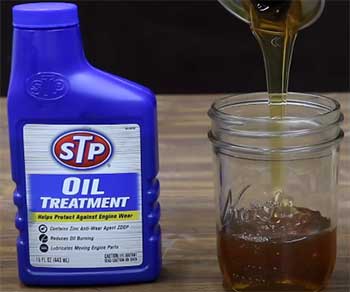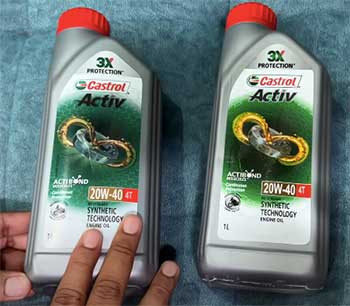When it comes to choosing engine oil, the choices can seem overwhelming. A key decision for many vehicle owners and mechanics is between STP and Castrol oils.
This detailed analysis aims to demystify the choice, showcasing the unique advantages and potential disadvantages of both oil brands.
A Comparative Overview
To provide a clearer perspective, here’s a comparison table summarizing the key differences between STP and Castrol oils:
| Factors | STP | Castrol |
| Viscosity Ratings | Covers common grades (e.g., 5W-30, 10W-40) | Wider range, including lower viscosities (e.g., 0W-20, 0W-40) |
| Additives | Basic additive package to reduce sludge and neutralize acids | Advanced additives like fluid titanium technology for superior engine protection |
| Performance | Reliable for most vehicles, may not suit high-performance cars | Engineered for high performance, suitable for a wide range of vehicles |
| Cost | Generally more affordable | Higher cost but offers advanced technology and superior performance |
An Overview of STP Oil
STP is a renowned name in the automotive lubricant industry. With a long history of providing reliable engine oils, they’ve gained significant trust among customers.
- Pros of STP Oil

STP’s major strengths lie in its affordability and wide range.
It provides a comprehensive selection for various needs, from synthetic blends to high-mileage and full-synthetic oils.
STP’s full-synthetic oil stands out in particular.
With enhanced thermal stability, it can perform under extreme temperatures.
It offers excellent protection against engine wear, resulting in a smoother, more responsive ride.
- Cons of STP Oil
On the downside, some users have noted that STP doesn’t offer the longest oil change intervals compared to other brands. This may mean more frequent maintenance for your vehicle.
Additionally, while STP oil is suitable for synthetic oil, it might not be the best fit for luxury or performance cars that demand top-tier lubricants.
Introducing Castrol Oil
Castrol is another established brand, renowned for its innovation and advanced technology. It provides an array of engine oils, each designed to meet specific engine needs.
- Pros of Castrol Oil
The significant advantage of Castrol oil is its high performance. Castrol’s full-synthetic oil, for instance, is engineered with fluid titanium technology, providing superior protection against engine stress.
In addition, Castrol oil offers longer oil change intervals. That means less frequent trips to the mechanic and a more cost-effective solution in the long run.
- Cons of Castrol Oil
Despite its high performance, Castrol oil comes with a higher price tag, making it a less attractive option for those on a tight budget. Additionally, while it’s a reliable brand, some users have reported that their engines run a little hotter with Castrol.
Key Differences Between STP and Castrol Oils
Though both STP and Castrol oils have their strengths and weaknesses, when choosing the best oil for your vehicle, understanding their key differences becomes crucial.
Here, we’ll compare the two brands in-depth, focusing on the crucial aspects of engine oil: viscosity, additives, performance, and cost.
- Viscosity Ratings

Viscosity ratings refer to an oil’s flow at different temperatures.
Both STP and Castrol offer a variety of multi-viscosity options, catering to a wide range of engine requirements.
STP oils generally cover common viscosity grades such as 5W-30 and 10W-40.
They provide suitable performance for everyday commuting in moderate climatic conditions.
On the other hand, Castrol provides a wider range of viscosity grades, including 0W-20 and 0W-40, making it a more versatile choice.
These lower viscosity grades offer superior engine protection during cold starts and ensure efficient performance in extreme weather conditions.
- Additive Packages
Additives enhance oil performance, providing anti-wear, detergent, and dispersant properties. Both STP and Castrol incorporate robust additive packages in their oils.
STP oils contain additives that help maintain oil viscosity, reduce engine sludge, and neutralize harmful acids. However, the exact composition and concentration of additives can vary across their product line, so it’s crucial to choose based on your engine’s specific needs.
Castrol oils, particularly the high-end synthetic options, incorporate proprietary additives such as fluid titanium technology. This transforms the oil under pressure, providing a protective layer that significantly reduces engine wear.
- Performance
Performance is where we see a clear distinction between STP and Castrol oils.
While STP oils offer reliable performance for most vehicles, they might not be the best fit for high-performance cars or those driven under extreme conditions.
Castrol oils, especially the full-synthetic varieties, are engineered for high performance. Their oils offer superior protection against engine stress, ensuring smooth and efficient engine operation even under severe driving conditions.
- Cost
In terms of cost, STP oils generally come out ahead. Their oils offer good value for the price, making them a go-to choice for those on a budget or with less demanding engine needs.
Castrol oils, while higher in cost, justify their price with advanced technology and superior performance. For drivers who prioritize long-term engine health and performance over immediate cost savings, Castrol may be the better choice.
In conclusion, both STP and Castrol are reliable brands, each offering unique advantages. STP offers affordability and range, while Castrol promises superior performance and longer oil change intervals.
However, Castrol’s higher cost and STP’s potentially shorter service intervals could be deal-breakers for some customers.
Also Read: Comparison of Valvoline And STP Oils.
Frequently Asked Questions (FAQ)
Yes, STP is a reliable and affordable option for many vehicle owners. It offers a wide range of products to cater to different needs.
STP oil is produced by The Armor All/STP Products Company, a subsidiary of Energizer Holdings, known for its wide range of automotive care products.
Yes, STP does offer synthetic oil options which are designed to provide excellent engine protection and performance. However, it may not be the best fit for high-performance vehicles that require top-tier lubricants.
The best engine oil brand can vary depending on your vehicle’s specific needs, your budget, and personal preference. Both STP and Castrol have their unique strengths, with STP being more budget-friendly, and Castrol offering superior performance.
Wrapping Up
Ultimately, choosing between STP and Castrol oil comes down to what you prioritize for your vehicle – whether that’s cost-effectiveness, performance, or a balance between the two.

